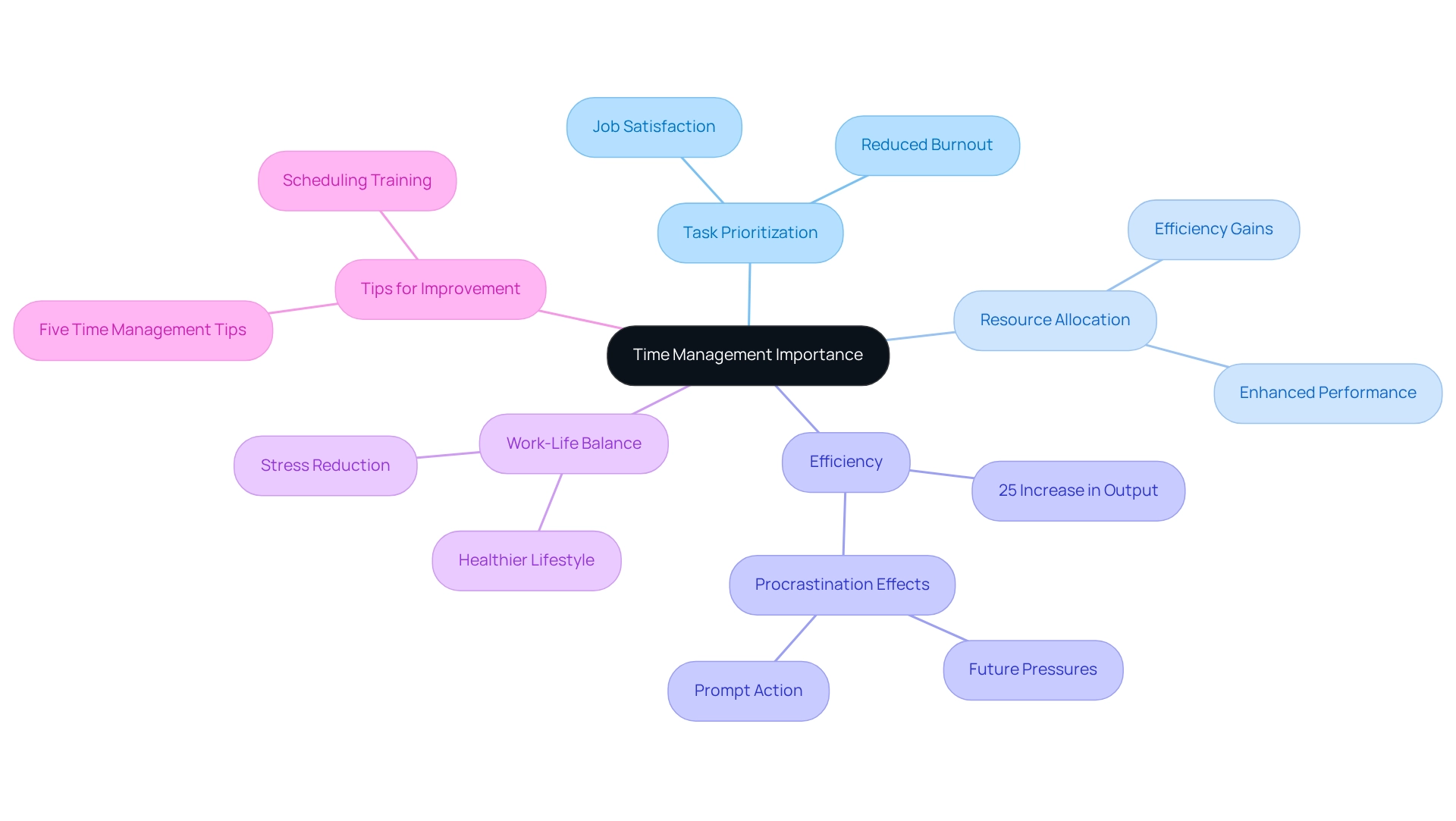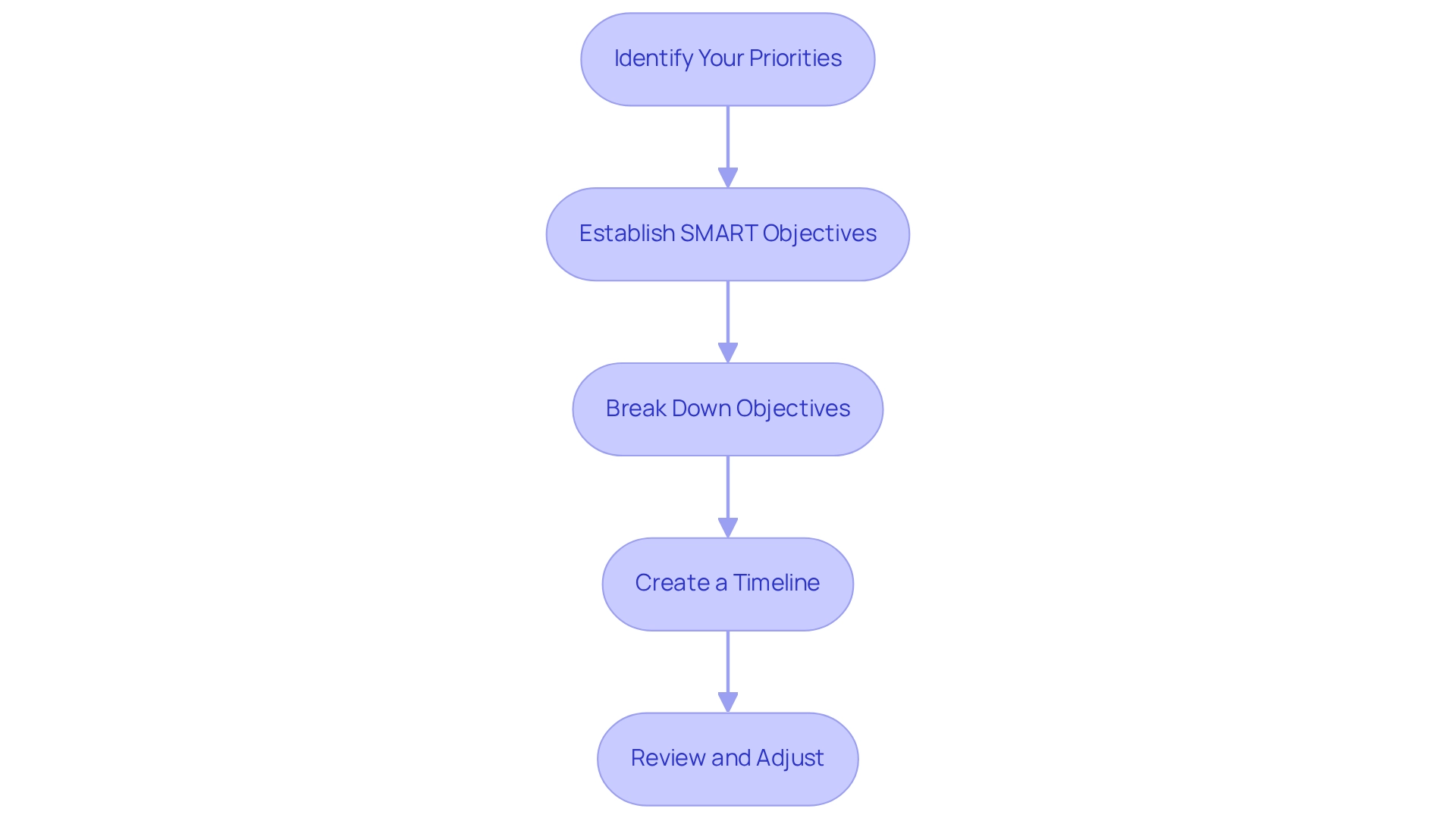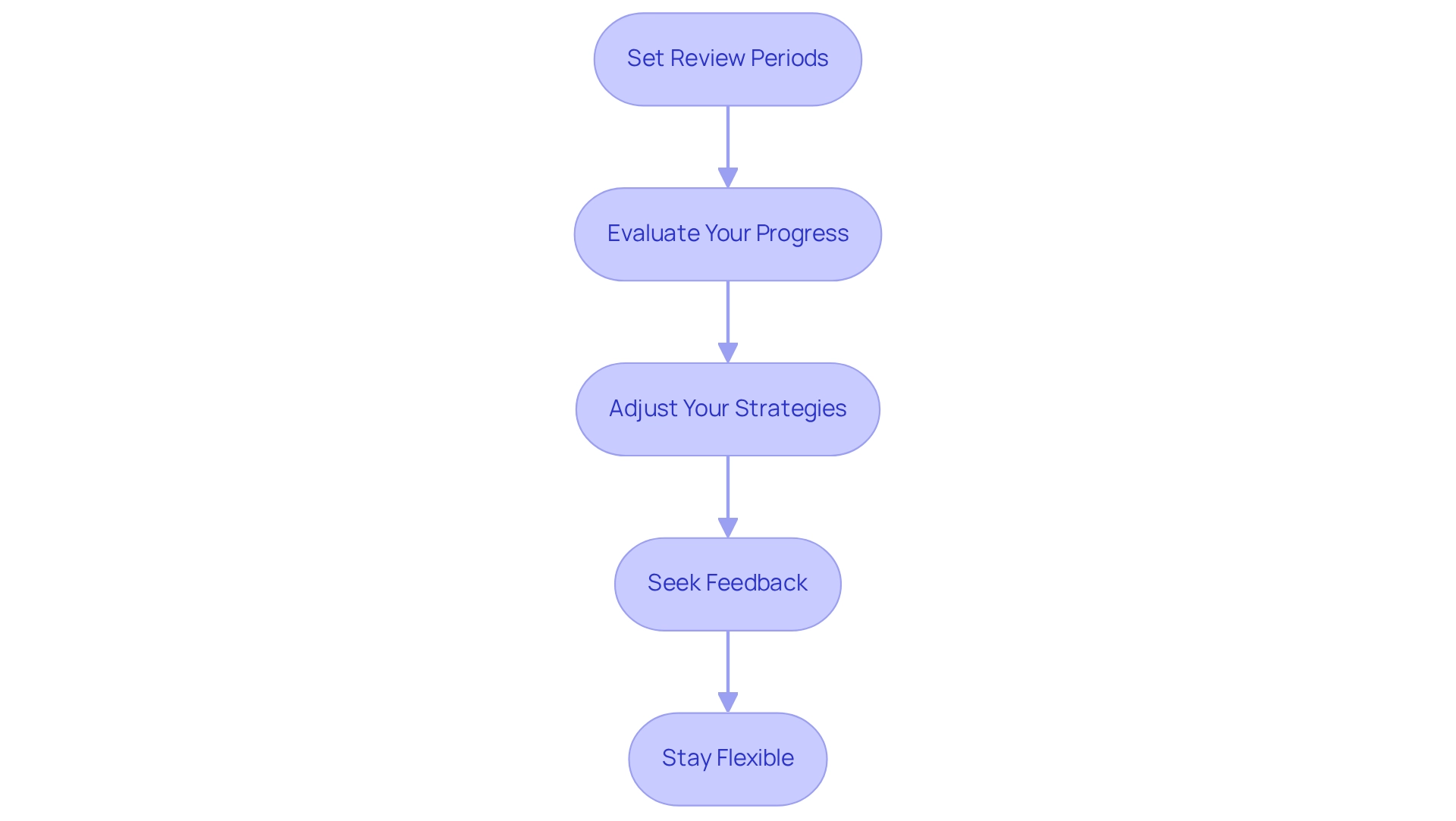Overview
The article outlines five essential time management strategies aimed at significantly enhancing productivity. These include:
- Prioritizing tasks
- Setting SMART objectives
- Breaking down larger tasks
- Creating timelines
- Conducting regular reviews
Evidence supports that effective time management can increase output by 25% while enhancing job satisfaction. Such improvements ultimately lead to superior employee performance and reduced stress levels. By implementing these strategies, organizations can navigate the complexities of workforce management more effectively.
Key Highlights:
- Time management is crucial for prioritizing tasks, reducing stress, and achieving goals efficiently.
- Effective scheduling is linked to higher job satisfaction and lower burnout rates.
- Utilizing five time management tips can increase output by 25%.
- Organizations that provide scheduling training see improvements in employee performance and morale.
- Procrastination can lead to increased pressure, highlighting the need for timely task completion.
- Establishing SMART objectives helps clarify goals and enhance accountability.
- Breaking down larger tasks into smaller steps reduces overwhelm and facilitates progress.
- Regular reviews of time management strategies are essential for ongoing improvement.
- Flexibility in adjusting goals and strategies is necessary to adapt to changing workloads.
Introduction
In a world where every second counts, mastering the art of time management emerges as a vital skill for success. Individuals and organizations alike are uncovering the profound impact of effective time management—not only does it enhance productivity, but it also fosters a healthier work-life balance and greater job satisfaction.
With a direct correlation to reduced stress and increased efficiency, the ability to prioritize tasks and set realistic goals is essential for navigating today’s fast-paced environment. As professionals strive to optimize their performance, the strategies for managing time effectively are more critical than ever, promising substantial rewards for those willing to embrace them.
Are you ready to take charge of your time and unlock your potential?
Understand the Importance of Time Management
Time organization is an essential skill that empowers individuals to prioritize tasks, allocate resources effectively, and achieve their goals with greater efficiency. Mastering this skill not only reduces stress but also improves efficiency and fosters a healthier work-life balance. The significance of scheduling is underscored by its direct relationship with job satisfaction; individuals who excel in organizing their hours frequently report greater levels of job satisfaction and reduced burnout rates.
Indeed, research indicates that utilizing five time management tips for efficient scheduling can yield a 25% increase in output, emphasizing its critical role in personal and professional achievement. By concentrating on what truly matters, individuals can ensure that their efforts yield optimal results.
For instance, organizations that prioritize scheduling training have observed noteworthy enhancements in employee performance and morale. This is evidenced by the remarkable success at Boutique Recruiting, where efficient scheduling has positively influenced the recruitment process and client satisfaction, as highlighted by testimonials from satisfied clients.
Furthermore, professional insights affirm that procrastination can exacerbate future pressures, advocating for prompt action to enhance efficiency and reduce stress. As William Shakespeare aptly noted, ‘Better three hours too soon than a minute too late.’ This sentiment resonates in the workplace, where timely decision-making and task completion are paramount.
John Rampton, co-founder and CEO of Calendar, emphasizes that efficient scheduling is crucial for boosting output in any professional environment. By implementing five time management tips, professionals can enhance their productivity and contribute to a more dynamic and successful work environment.

Plan and Set Realistic Goals
To efficiently manage your time, you should start with strategic planning and the establishment of achievable objectives by following these five time management tips. Here’s how to do it:
- Identify Your Priorities: Start by listing your tasks and categorizing them based on urgency and importance. The Eisenhower Matrix serves as a valuable tool for distinguishing between urgent and important tasks, thereby helping you focus on what truly matters.
- Establish SMART Objectives: Formulate objectives that are Specific, Measurable, Achievable, Relevant, and Time-bound. For instance, rather than stating ‘I want to be more productive,’ specify ‘I will complete three major tasks by the end of the week.’ An excellent SMART objective could be to complete an advanced course in digital marketing within the next six months. This clarity enhances focus and accountability.
- Break Down Objectives: Decompose larger objectives into smaller, actionable steps. This approach reduces overwhelm and facilitates incremental progress.
- Create a Timeline: Assign deadlines to each task to maintain accountability. Utilizing a planner or digital calendar can help visualize your schedule and ensure timely completion of tasks.
- Review and Adjust: Regularly evaluate your progress and be prepared to adjust your goals as necessary. This adaptability enables you to remain aligned with your priorities and adjust to evolving situations, while the implementation of five time management tips not only enhances productivity but also fosters a proactive mindset towards scheduling—vital for achievement in today’s competitive landscape. As Edmond Mbiaka aptly stated, ‘One of the differences between some successful and unsuccessful people is that one group is full of doers, while the other is full of wishers.’ This underscores the significance of taking action in your scheduling endeavors. Furthermore, monitoring SMART objectives and linking them to daily work tasks can improve achievement by keeping aims in focus and incorporated into routine workflows. Boutique Recruiting’s remarkable history highlights the efficacy of tailored objective setting and scheduling in attaining successful results.

Conduct Regular Reviews and Adjust Strategies
Consistently assessing your management strategies is essential for ongoing enhancement. In fact, the significance of routine evaluations in scheduling cannot be overstated. Here’s how to effectively implement this practice:
- Set Review Periods: Establish a consistent schedule for your reviews—weekly or monthly is often ideal. This routine allows you to reflect on what strategies are effective and which ones need adjustment.
- Evaluate Your Progress: During each review, assess your achievements against your set goals. Identify tasks that surpassed your anticipated duration and examine the reasons behind any setbacks.
- Adjust Your Strategies: Use your evaluations to refine your approach. If specific techniques, such as blocking schedules or the Pomodoro Technique, aren’t yielding the desired outcomes, be willing to try new approaches.
- Seek Feedback: Collect insights from colleagues or mentors regarding your time management effectiveness. Their perspectives can highlight areas for improvement that you might overlook.
- Stay Flexible: Adapt your goals and strategies as your workload and priorities evolve. Flexibility is essential for sustaining productivity in a changing environment.
Statistics indicate that the average duration lost per individual has decreased from 1.64 hours in 2022 to 1.25 hours in 2024, showcasing the effectiveness of organized management practices. This decrease not only reflects improved personal efficiency but also correlates with increased performance and revenue for businesses. Moreover, a case study shows that business owners dedicate merely 34% of their hours to activities that are both significant and urgent. How can you shift this allocation towards more essential activities? Regular reviews can help achieve this.
As Paul J. Meyer aptly stated, “Productivity is never an accident. It’s always the result of a commitment to excellence, intelligent planning, and focused effort.” By implementing regular reviews, you can enhance your time management effectiveness using these five time management tips and ultimately boost productivity.

Conclusion
Mastering time management is not merely a beneficial skill; it stands as a fundamental component of success in both personal and professional realms. The significance of prioritizing tasks, setting realistic goals, and conducting regular reviews emerges as essential strategies for enhancing productivity and achieving a healthier work-life balance. Such practices not only lead to reduced stress levels but also foster increased job satisfaction, underscoring the direct link between effective time management and overall well-being and performance.
By identifying priorities and leveraging tools like the Eisenhower Matrix, individuals can concentrate on what truly matters. The SMART goals framework further assists in crafting clear and actionable objectives, facilitating incremental progress and accountability. Regular evaluations of time management strategies empower individuals to adapt to changing circumstances and continuously refine their approaches.
Ultimately, embracing effective time management techniques is crucial for navigating the fast-paced demands of today’s world. As professionals implement these strategies, they not only enhance their own productivity but also contribute to a more dynamic and successful work environment. Taking charge of time is an empowering step toward unlocking one’s full potential and achieving lasting success. Now is the time to prioritize time management and experience the transformative impact it can have on both personal fulfillment and professional achievement.
Frequently Asked Questions
Why is time organization considered an essential skill?
Time organization is essential because it empowers individuals to prioritize tasks, allocate resources effectively, and achieve their goals with greater efficiency, ultimately reducing stress and improving work-life balance.
How does scheduling relate to job satisfaction?
Scheduling is directly related to job satisfaction; individuals who excel in organizing their hours often report higher levels of job satisfaction and lower rates of burnout.
What impact can effective time management have on productivity?
Utilizing five time management tips for efficient scheduling can lead to a 25% increase in output, highlighting its importance in personal and professional achievement.
How can organizations benefit from prioritizing scheduling training?
Organizations that prioritize scheduling training have seen improvements in employee performance and morale, as evidenced by the positive impact on the recruitment process and client satisfaction at Boutique Recruiting.
What is the relationship between procrastination and efficiency?
Procrastination can worsen future pressures, making prompt action crucial for enhancing efficiency and reducing stress.
What does John Rampton say about efficient scheduling?
John Rampton emphasizes that efficient scheduling is vital for boosting output in any professional environment, and implementing time management tips can enhance productivity.
What are the potential outcomes of mastering time management?
Mastering time management can lead to optimal results in efforts, improved productivity, and a more dynamic and successful work environment.
